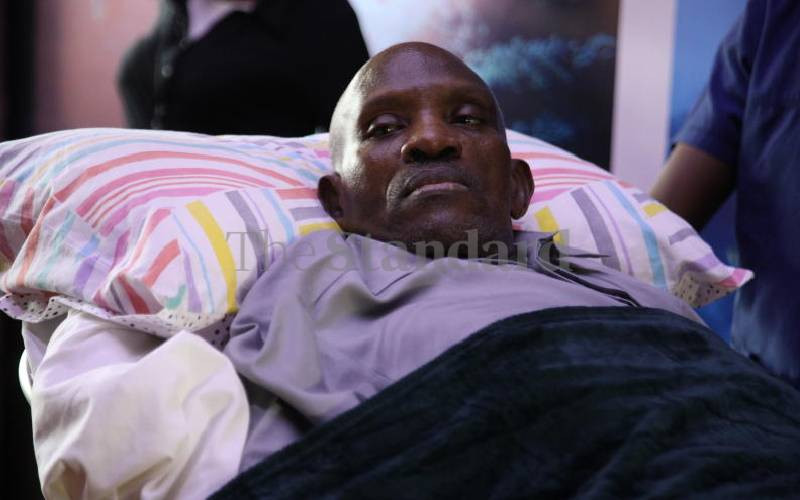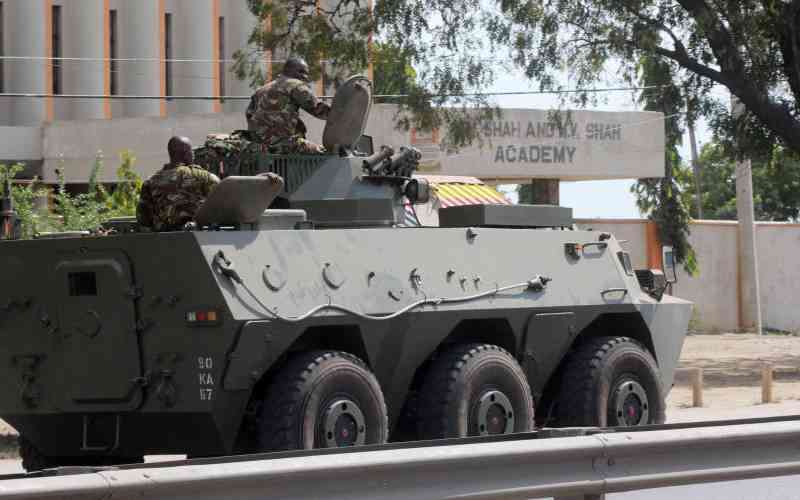 |
|
The late Private Jasper Onguso.[PHOTO: STANDARD/COURTESY] |
By PAUL WAFULA and NYAMBEGA GISESA
NAIROBI, KENYA: There is only one reason why scores of military officers in uniform arrived at Joseph Onguso Nyabanga’s home in Nyamira County on that gloomy day in 2012. His son, Private Jasper Onguso, 26, was dead.
He had been killed on the frontline in Somalia, fighting for his motherland.
Before his death, Mr Onguso had been mourning silently for seven days, pleading with God to spare his first-born son, who had had a premonition of his own death. Jasper had already warned him that he was unlikely to return home alive.
“The last time I spoke with him, he told me he was not coming home. He said that his friends had gone (died). That was on a Saturday. The next Saturday, Jasper was dead,” recalls Mr Onguso.
Jasper had told his father in that phone call that they were approaching Kismayu.
“We spoke for about one hour. He was saying ‘aaaah ahh…ahh…ahh…, daddy I may not come back my friends have died,” the father narrated.
Jasper was the 26th Kenyan soldier to die in the ongoing battle against Al-Shabaab, according to official military records. The former Ringa Secondary School student died on September 23, 2012.
“Part of his head was not there, it was very painful. When my dad died a few years back, I never wept. My mother also died. I cried but not a lot. But when my son died, I wept,” his dad recalls.
Onguso was not the only person who was overcome by grief. When Jasper’s body arrived home for burial, his young wife cried uncontrollably. Two days after his burial, she left home and has never returned.
“The young man was the breadwinner. He was a friend, a brother and at times he used to guide me. I had invested all my resources on him,” says Onguso, who reveals that his son tried three times to join the military before he was finally enlisted.
Onguso, who has nine children, says the military should find a way of psychologically preparing parents when their children are sent out on such dangerous missions.
“I sometimes ask myself why the Government took these young men to Somalia while there are more elderly people in the army who should have gone. If they must take young men, then they should have given them some elderly people to guide them on what to do,” he says looking at the receding mound of soil on his son’s grave.
The fallen soldier was a long distance runner and a sharp shooter in the military. His father still has the uniform and boots that he wore.
Luckily, the Ongusos are among families that have been compensated following the deaths of their relatives, but not before making countless trips to the military offices in Eldoret and Nairobi.
Stay informed. Subscribe to our newsletter
He says he also made many trips to the bank “until the teller knew his face”. But ironically, Onguso says not even a penny of this cash has been spent by his family. The money is still lying untouched in the family’s bank account.
“I needed my son alive, not the money. This was a young man,” he says.
PEANUTS
Onguso is also unhappy with the amount that was paid as compensation. “A soldier sleeps outside like a dog, then they give me peanuts,” retorts a visibly angry Onguso.
“I was not selling my son, but anything less than Sh10 million is peanuts,” he says.
Most families we have spoken to say they received about Sh5 million or less. Others, however, said they received Sh800,000. Part of the money was given by Amisom as insurance, while Private Onguso’s pension was given to the family a few months later.
Onguso accuses the Government, that he works for, of not being sincere in the manner it handled their losses.
“When they come for the funerals, let them not promise heaven which is not there,” he says. The military had pledged to recruit one of his five boys back into the force as a replacement for his late son.
 The Standard Group Plc is a
multi-media organization with investments in media platforms spanning newspaper
print operations, television, radio broadcasting, digital and online services. The
Standard Group is recognized as a leading multi-media house in Kenya with a key
influence in matters of national and international interest.
The Standard Group Plc is a
multi-media organization with investments in media platforms spanning newspaper
print operations, television, radio broadcasting, digital and online services. The
Standard Group is recognized as a leading multi-media house in Kenya with a key
influence in matters of national and international interest.
 The Standard Group Plc is a
multi-media organization with investments in media platforms spanning newspaper
print operations, television, radio broadcasting, digital and online services. The
Standard Group is recognized as a leading multi-media house in Kenya with a key
influence in matters of national and international interest.
The Standard Group Plc is a
multi-media organization with investments in media platforms spanning newspaper
print operations, television, radio broadcasting, digital and online services. The
Standard Group is recognized as a leading multi-media house in Kenya with a key
influence in matters of national and international interest.









